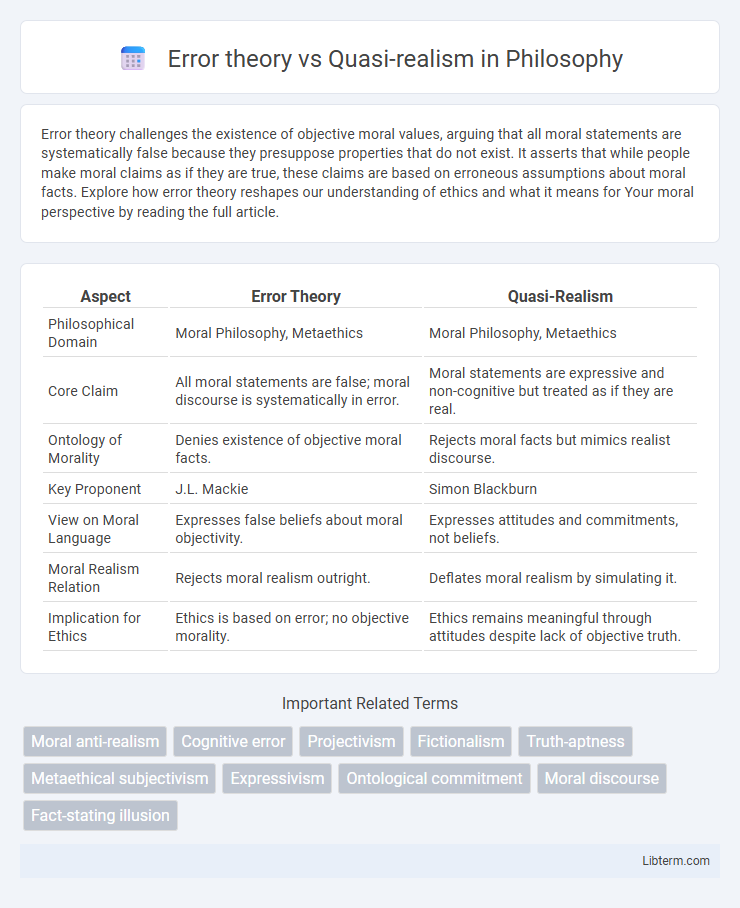Error theory challenges the existence of objective moral values, arguing that all moral statements are systematically false because they presuppose properties that do not exist. It asserts that while people make moral claims as if they are true, these claims are based on erroneous assumptions about moral facts. Explore how error theory reshapes our understanding of ethics and what it means for Your moral perspective by reading the full article.
Table of Comparison
| Aspect | Error Theory | Quasi-Realism |
|---|---|---|
| Philosophical Domain | Moral Philosophy, Metaethics | Moral Philosophy, Metaethics |
| Core Claim | All moral statements are false; moral discourse is systematically in error. | Moral statements are expressive and non-cognitive but treated as if they are real. |
| Ontology of Morality | Denies existence of objective moral facts. | Rejects moral facts but mimics realist discourse. |
| Key Proponent | J.L. Mackie | Simon Blackburn |
| View on Moral Language | Expresses false beliefs about moral objectivity. | Expresses attitudes and commitments, not beliefs. |
| Moral Realism Relation | Rejects moral realism outright. | Deflates moral realism by simulating it. |
| Implication for Ethics | Ethics is based on error; no objective morality. | Ethics remains meaningful through attitudes despite lack of objective truth. |
Introduction to Moral Anti-Realism
Error theory and quasi-realism represent influential approaches within moral anti-realism, which denies objective moral facts. Error theory asserts that all moral claims are systematically false due to the nonexistence of moral properties, emphasizing a realist-like discourse that ultimately fails. Quasi-realism, pioneered by Simon Blackburn, seeks to explain how our moral language and practices mimic realism by expressing attitudes rather than stating facts, allowing moral discourse to function meaningfully without objective truth.
Defining Error Theory
Error theory asserts that all moral statements are systematically false because they presuppose objective moral values that do not exist. It denies the existence of any mind-independent moral facts, rendering moral discourse fundamentally mistaken. This contrasts with quasi-realism, which accepts that moral statements function as if true without committing to objective moral properties.
Core Tenets of Quasi-Realism
Quasi-realism asserts that moral statements express genuine attitudes rather than objective truths, aiming to explain moral discourse without commitment to moral facts, contrasting error theory's claim that all moral statements are false. It employs expressivist strategies to capture the practical function of moral language, preserving the appearance of truth and objectivity in ethical discussions. This approach reconstructs moral reasoning and disagreement, treating moral judgments as projections of subjective attitudes shaped by social practices.
Historical Background and Key Proponents
Error theory, developed prominently by J.L. Mackie in the 1970s, argues that moral statements attempt to report objective truths but systematically fail because there are no moral facts. Quasi-realism, advanced by Simon Blackburn in the 1980s and 1990s, seeks to explain how moral discourse can retain realist expressions despite being rooted in non-cognitivist attitudes. Both positions emerged from the broader non-cognitivist tradition in metaethics, challenging moral realism by analyzing the nature and function of moral language.
Semantic Claims of Error Theory
Error theory posits that moral statements implicitly express propositions that systematically fail to correspond to any objective moral facts, rendering them uniformly false. It claims that while moral discourse is meaningful, the semantic content of moral language presupposes the existence of moral properties that do not exist in reality. This semantic framework contrasts with quasi-realism, which interprets moral statements as expressions of attitudes or prescriptions without committing to the objective truth of those claims.
Quasi-Realism and Moral Discourse
Quasi-realism interprets moral discourse as expressing attitudes and commitments without presupposing objective moral facts, aiming to explain how people talk about morality as if it were real while denying its independent existence. Unlike error theory, which claims all moral statements are false due to the absence of moral facts, quasi-realism preserves the normative force of moral language by reconstructing its expressive function. This approach enables meaningful moral disagreements and commitments without ontological moral realism.
Comparing Ontological Commitments
Error theory asserts that moral statements systematically fail to correspond to objective moral facts, committing to the ontological position that no such moral facts exist. Quasi-realism accepts the stance of error theory on the nonexistence of objective moral properties but aims to explain moral discourse as expressive and projectional, without denying the practical functionality of moral language. This comparison reveals that error theory's ontological commitment is to moral nonexistence, while quasi-realism remains ontologically minimalist but supports a realist-seeming moral practice.
Addressing the Frege–Geach Problem
Error theory asserts that moral statements are systematically false because there are no objective moral facts, posing challenges for logical consistency in embedded moral assertions. Quasi-realism, developed by Simon Blackburn, addresses the Frege-Geach Problem by explaining how moral language retains logical coherence and can be meaningfully embedded in complex sentences without assuming objective truths. This approach enables quasi-realists to preserve the functional role of moral discourse while avoiding the metaphysical commitments that trouble error theorists.
Practical Implications and Criticisms
Error theory denies the existence of moral facts, asserting that all moral statements are false, which leads to challenges in motivating moral behavior and justifying moral discourse. Quasi-realism mimics realist discourse by expressing moral attitudes without committing to objective truths, aiming to preserve practical engagement in ethics while avoiding metaphysical commitments. Critics argue error theory undermines moral practice by promoting skepticism, whereas quasi-realism faces accusations of inconsistency for simulating realism without ontological support.
Conclusion: Evaluating Error Theory vs Quasi-Realism
Error theory asserts that moral statements systematically fail to describe objective facts, concluding that all moral discourse is fundamentally mistaken. Quasi-realism, while acknowledging the absence of objective moral truths, argues that moral language can be meaningfully and coherently used to express attitudes and guide behavior. Evaluating these positions, Quasi-realism offers a more pragmatic framework by preserving moral practices without committing to metaphysical realism, whereas Error theory demands rejecting moral discourse altogether due to its inherent falsehood.
Error theory Infographic

 libterm.com
libterm.com